It feels that Holy Saturday, also known as the Easter Vigil, gets lost in Holy Week, that our greatest wish is to skip straight from Good Friday to Easter Sunday, and yet, for me, this ‘day between’ is one of the most beautiful and tender days of the year, even though it is a terrible beauty indeed.
Holy Saturday marks the day when Jesus’ body lies in the tomb. We know what is coming on Easter Sunday but those who followed and loved Jesus did not. This is a day of contemplation and mourning. God is dead and we are alone in a cold universe.
But there is, of course, so much more to this day than that.
In medieval tradition the time between the Crucifixion and the Resurrection was known as the ‘Harrowing of Hell’. By descending into the realm of the dead, Christ frees souls who have been trapped there since the world began. This was a story that was hugely popular in the Middle Ages and was seen as a promise of liberation. This was at a time when medieval peasants believed, or hoped to believe, in Cockaigne; a land of plenty in which the harshness of medieval life didn’t exist. Cockaigne is a sort of ‘world turned upside down’ where everything is turned on its head and power relations are flipped, a place where the restrictions of society are rebelled against. Here, abbots are beaten by their monks, nuns show their bottoms, and the sky rains cheese! In Cockaigne grilled geese fly straight into waiting mouths and fish jump out of the water to land at one’s feet, the houses are made of barley sugar and the streets of pastry, the weather is always mild, sex is freely available, and wine flows like water. Cockaigne was indeed a "medieval peasant’s dream, offering relief from backbreaking labor and the daily struggle for meager food." Living under the feudal system, the precursor of Capitalism, and under threat from plagues such as the Black Death, no wonder that the people of the land sought relief in visions of a perfect paradise and the promise of liberation for those consigned to hell.
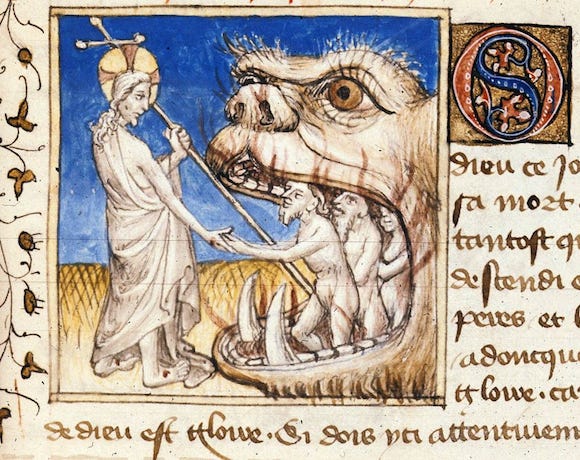
In her book, ‘Winters in the World: a Journey Through the Anglo-Saxon Year’, Eleanor Parker writes of the Harrowing of Hell that it was, “a story telling how the king of justice stormed the prison of evil and set the captives free,” and that, “its English name: ‘harrowing’ comes from Old English hergian, ‘to harry, pillage’, a word commonly used of Viking armies and other military threats, but adapted by Anglo-Saxon preachers and poets to refer to Christ’s victory over the forces of darkness.”
So important was Holy Saturday to our medieval ancestors that the liturgy for Easter Eve included a ritual drama reenacting the meeting of the women at the tomb and the angel who tells them that the tomb is empty and Christ has risen. The drama would be acted out by four monks playing all the roles by wearing cloaks for the women and a white robe for the angel. There is a story from the 11th Century that an unwell man received a miraculous healing when he attended a performance of this ritual drama in Canterbury Cathedral. Eleanor Parker tells us that, for our medieval forebears, “This holy night had mighty power, an earth'-shaking force of joy.” Just as, “hell’s prisoners are set free from captivity and Christ bursts from the tomb…earth is released from its winter chains as the ice melts in a thawing, freeing flood.” Both the warming of the season and the moment of Christ’s death bring “a kind of universal spring thaw.”
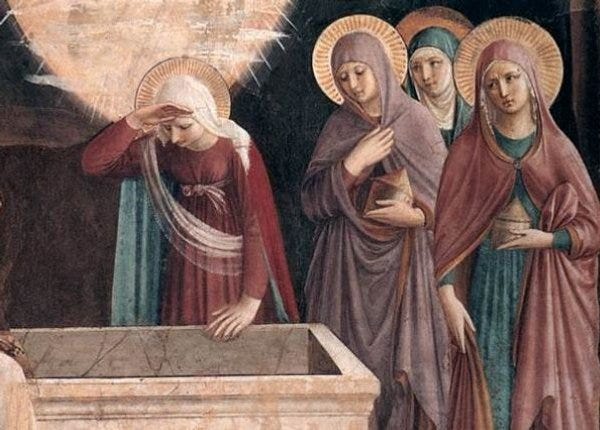
Retired pastor, Weldon Nisly writes powerfully of Holy Saturday in his essay, ‘The Powers of Death and Life. Lies and Truth’ for Radical Discipleship’s ‘Subverting Empire’ series;
“On this Holy Saturday between Good Friday and Easter Sunday, we live liturgically between the powers of death and the powers of life. All of us choose daily whether we worship death or life and are committed to lies or truth…As we await Jesus’ resurrection on this Holy Saturday, remember “resurrection is against the law. As Bill Wylie Kellerman explains in Seasons of Faith and Conscience, the sealed tomb was not to seal in the stench of body decay. It was the imperial power’s official seal of authority with presumed control over life and truth. Breaking the seal and rolling away the stone is a criminal act against the state. “Caesar, in Pilate….has set his seal of approval on Jesus’ death….When the seal is broken in the resurrection, it stands among the signs that the powers of death have been broken. The dominion of political imperial authority has been cut to the heart.”
And Bill Wylie-Kellerman in his own writing on Easter Eve, ‘Sermon: Death Has No Dominion’, explains that ‘dominion over death’ is not about the avoiding the natural process of our physical death but that, “the resurrection means living in freedom from death…(willing and able) to risk it all in the struggle for life.” This reminds me of one of my favourite quotes, which comes from a Tumblr post on fungi, “You cannot kill me in a way that matters.”
As political activist and suffragette Emmeline Pankhurst wrote, "I would rather be a rebel than a slave. I would rather die than submit; and that is the spirit that animates this movement…..I mean to be a voter in the land that gave me birth or they shall kill me, and my challenge to the Government is: kill me or give me my freedom: I shall force you to make that choice."
The powers and principalities of the anti-life pulse on this earth, can only kill us but Christ’s death and resurrection, his turning the world upside down, reminds us that they “cannot kill us in a way that matters”. And, as we sit in the dark of Holy Saturday we can choose to recommit to the struggle for life, to stand against Empire, militarism, white supremacy, materialism, patriarchy, homophobia, xenophobia, and on and on. As Bill Wylie-Kellerman says, we can “name names.”
On a more personal note, I, like so many of us, despair of this world and it would be so easy to turn away, to exist in a sort of ‘living death’, which is the antithesis of Holy Saturday and all that it stands for. I often say that I no longer have any hope that we can change, and that is so, but I also have huge hope in Life and in my wild Christ, who has shown me that there is nothing in this life to fear. I believe in ‘critical mass’; that everything can change in an instant, and I believe that, for the sake of Life, someone has to hold the line. When I stand up for what I believe is right, when I speak out with a wobbly voice, the Christ who loved life so deeply that he was willing to die for it is standing beside me and his crown of thorns has burst into blossom.
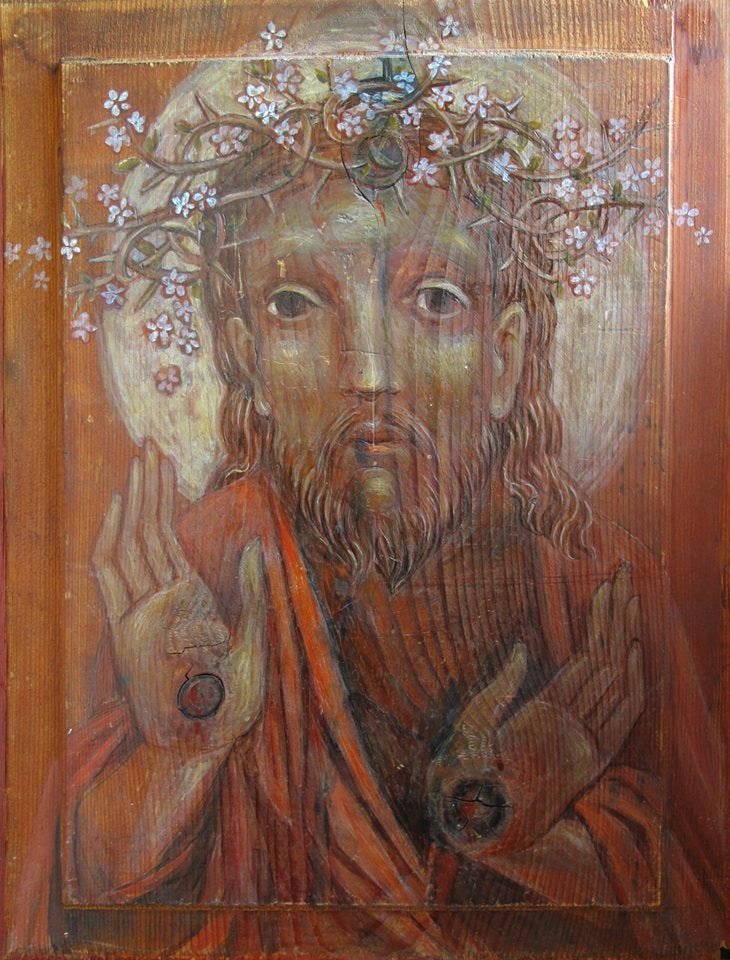
I will end with this poem/prayer from Jan Richardson’s beautiful book of blessings, ‘Circle of Grace’, and I wish us all a deep, meaningful, and blessed Holy Saturday;
Mary Magdalene and the other Mary were there,
sitting opposite the tomb ~ Matthew 27.61
This day between dying and rising.
This day that calls us to hold our anguish and our hope in the same hand.
This day that invites us to marvel that when our heart has been shattered, it somehow manages to keep beating. That we somehow manage to keep breathing.
Still.
In the Breath, another Breathing.
For Holy Saturday
Let it be
that on this day
we will expect
no more of ourselves
than to keep
breathing
with the bewildered
cadence
of lungs that will not
give up the ghost.
Let it be
we will expect
little but
the beating of
our heart,
stubborn in
its repeating rhythm
that will not
cease to sound.
Let it be
we will
still ourselves
enough to hear
what may yet
come to echo:
as if in the breath,
another breathing;
as if in the heartbeat,
another heart.
Let it be
we will not
try to fathom
what comes
to meet us
in the stillness
but simply open
to the approach
of a mystery
we hardly dared
to dream.
—Jan Richardson
from Circle of Grace: A Book of Blessings for the Seasons
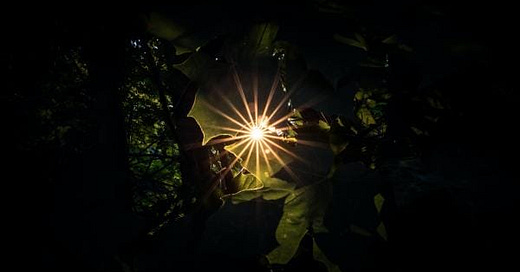



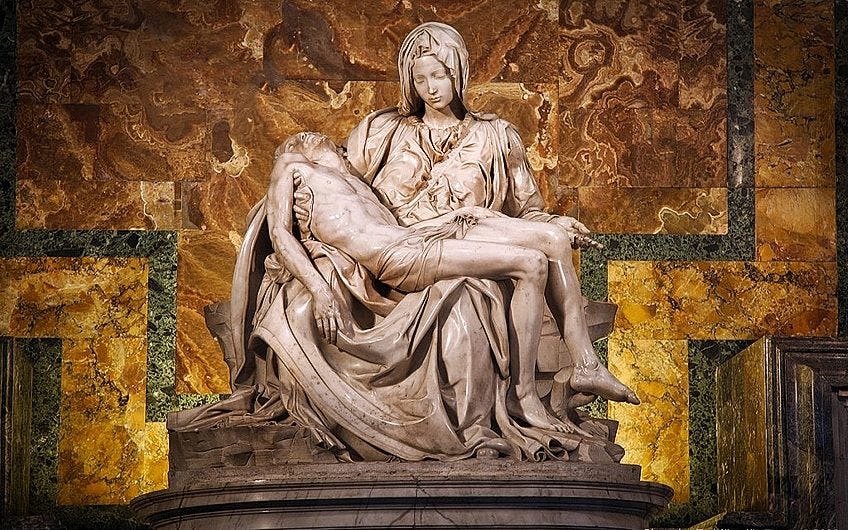
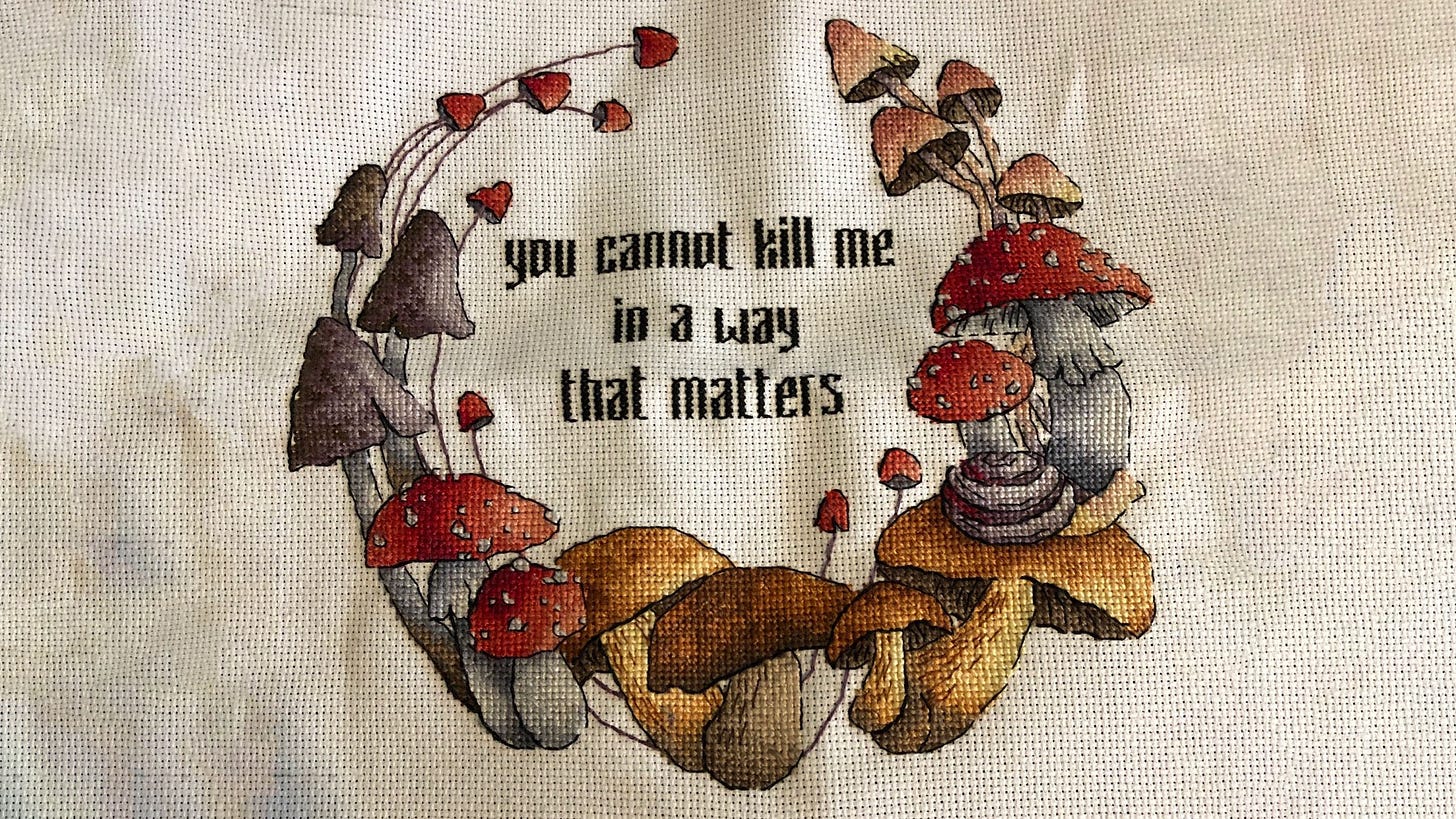
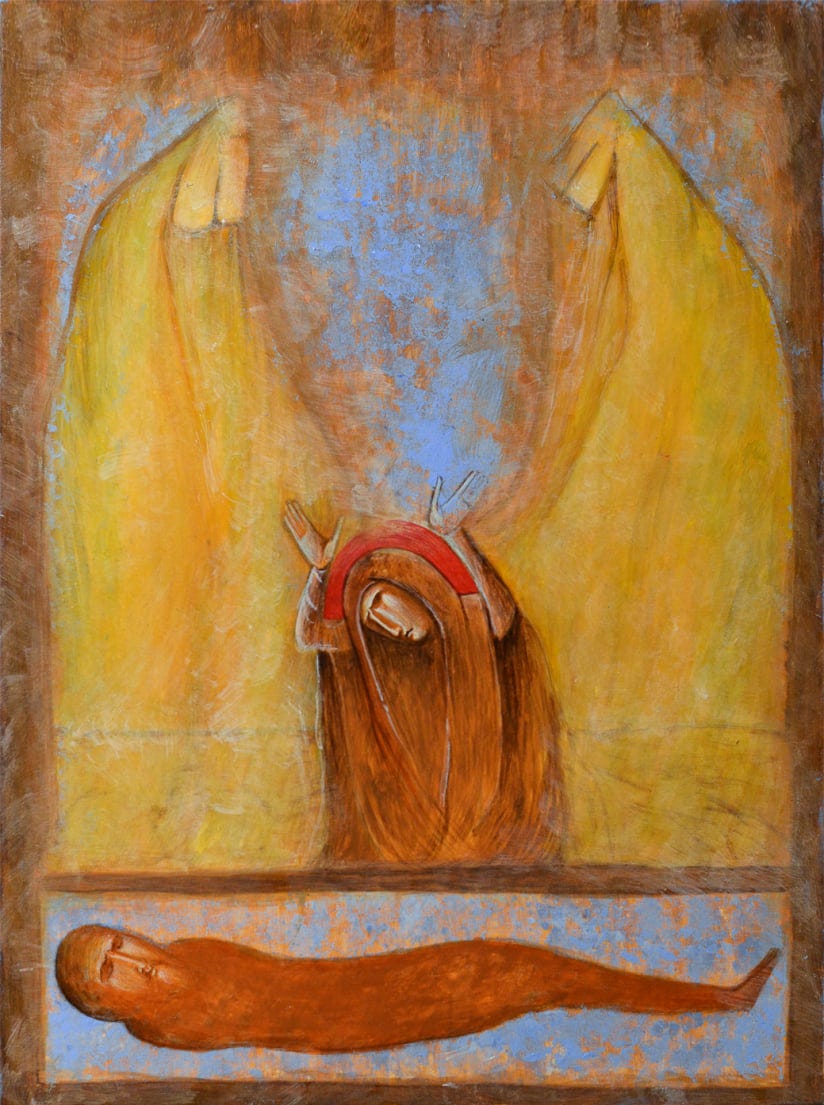
Oh AMEN my Wild Sister In Christ!
I’ve waited until Good Friday (here in the States) to tell you, that 20 years ago I embraced my wild Pagan self; but I was always aware of the Mother giving birth to a Son who would go on, into the wild…and so a dozen years after I danced in the moonlight, I, I, was brought back to the Christ-fold. There is much more to say, that I will not here-but I want you to know from a long history online that we shared (and I way in the background) you have helped me to embrace my self. My past. My present. My future.
Thank you so, so much. ❤️
Wonderful writing, dearest Jacqui, as usual! You really are amazing. Thanks so very much for the many gifts you give. Your loving thoughts and words, both spoken and written, are like jewelled little anchors. They calm and comfort, soothe and ground. I'm nurtured by my personal weaving of my Jewish, Pagan and Christian elements; and I honour the great Christ-teacher whom we connect to at this time. And you help me do this. Thank you! Easter blessings to you and yours xxx with love. xxx